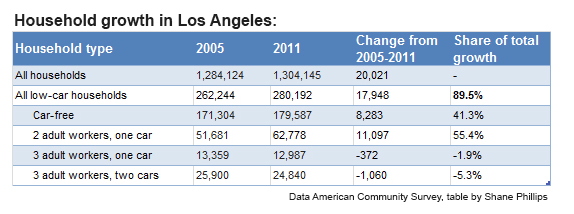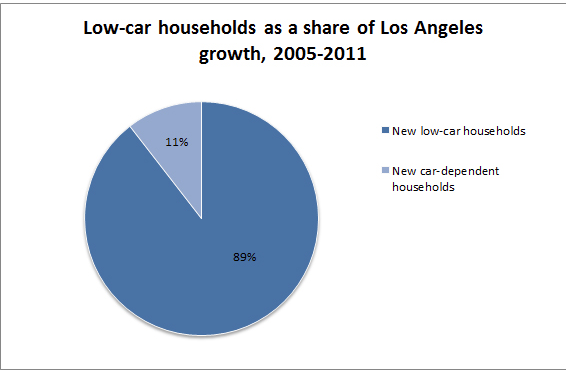I've never made it a secret that I'm one of the few Streetsblog editors that owns a car. But in the new Los Angeles, the one that prioritizes transit projects over highway expansion, that my family of four only has one car that we barely use is becoming the new normal.
Yesterday, Streetsblog.net reported on a review of census data by Bike Portland which showed that most of the residential growth in Portland is by households that are either car-free or car-lite. Later in the day, USC graduate student Shane Philips did the same review for Los Angeles at his website, Better Institutions.
The result? Los Angeles' residential growth is even more car-free and car-lite than Portland's. Let's take a quick look at Philips' chart and graph:

Wow! According to census data, L.A.'s growth is far outstripping its fabled car-dependency. Because the data is using census information that ends in 2011, before the city striped over one hundred miles of bike lanes, completed construction of the Expo Line, opened the Orange Line Extension, turned CicLAvia from a curiosity to a must-do event on the calendar, and painted bus-only lanes on Wilshire Boulevard.
In short, the growth trend from 2005-2011 most likely isn't an outlier, but the beginning of a generational change in how people make their transportation choices.
And while L.A.'s largest transportation project currently under construction is the laughably over-budget and behind-schedule 405 Sepulveda Pass Widening Project, it might be the last large freeway expansion project inside the city. The other major projects on the book, including the 710 Big Dig, the Long Beach 710 expansion project, the O.C.'s 405 widening project, and the High Desert Corridor are ones that will be built outside of city limits.
Update: As pointed out in the comments section, a portion of the southern end of the 710 Big Dig would be within city borders.
In fact, none of the Measure R highway projects take place inside of Los Angeles' borders, a fact regularly trumped by former Los Angeles Mayor Antonio Villaraigosa whenever other Metro Board Members complained about a lack of transit projects in other areas.
But, as Philips points out, the city can reap even more benefits from car-lite and car-free households by mounting a campaign against the Holy Grail of car culture a parking policy that forces car-free and car-lite households to subsidize the car dependent.
Philips writes:
With the right policies in place, we can reap even greater benefits. Right now much of the city still requires tons of parking for new apartments, often far more than developers think is necessary. And you can see why—when nearly half of the city's new residents don't even own cars, building a bunch of super-expensive parking for them doesn't make a lot of sense. Relaxing parking mandates would be nice for apartment-builders, but it'd really be nice for the people who live in them: as Michael Manville of UCLA found a while back, when you relax parking requirements you get more housing, and at lower prices. It's also good for business, as Santa Monica found recently.
Unfortunately, car-culture isn't just folding its tent and going away as exemplified by the media's glorifying a law change allowing people to park at expired parking meters. A few of them mentioned that there were no tickets given under the old law in 2013. That's right, the media was throwing a party over the perception that it would be easier to park a car.
Even while the city grows in a more and more car-free and car-lite direction, its record on policy is still a mixed bag.
But for today, the news is good. The L.A. of Steve Martin movies is changing, but the city needs to continue to evolve to meet the new generation of working households.






